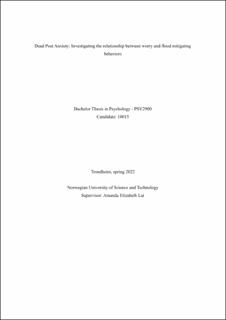| dc.contributor.advisor | Lai, Amanda Elizabeth | |
| dc.contributor.author | Waldrop, Erling | |
| dc.date.accessioned | 2022-07-13T17:21:09Z | |
| dc.date.available | 2022-07-13T17:21:09Z | |
| dc.date.issued | 2022 | |
| dc.identifier | no.ntnu:inspera:110854809:47021078 | |
| dc.identifier.uri | https://hdl.handle.net/11250/3005243 | |
| dc.description.abstract | Stude undersøker forholdet mellom individenes grad av bekymring og deres beskytende atferd, for folk som i Norge. Resultatene viste at deltagerne delvis favoriserer bruken av beskytende atferd. I motsetning til eksisterende litteratur, tydet correlasjons- og regresjonsanalysene på at beskytende atferd og grad av bekymring hadde en negativ correlasjon. Funnene som omfatter deltagernes grad av bekymring var ikke signifikante. Empiriske og teoretiske indikasjoner av funnene, blir diskutert | |
| dc.description.abstract | The present study aims to investigate the relationship between the individuals’ degree of worry and their protective behaviors, for people living in Norway. A structured survey was sent throughout the country, and 296 people responded. Participants were asked if they have adopted specific behaviors that would prevent the negative consequences of floods. Degree of worry was measured by the means of an item-set, which was validated and developed by Wilson, Zwickle & Walpole (2018). The items asked the participants to estimate their feelings of worry, in relation to climate change. Furthermore, the survey also asked the participants to appraise their perceived likelihood of a flood occurring, as well as their personal capacity to cope with floods (coping appraisal). The participants’ socio-demographic characteristics were also gathered. It was hypothesized that degree of worry would promote protective behavior better than perceived likelihood of a flood, and that coping appraisal would moderate the relationship between the variables regarding degree of worry and protective behaviors. Results displayed that participants slightly favor the use of protective behavior. Contrary to existing litteratur, correlational and regression analyses suggested that protective behavior and degree of worry had a negative association. The findings surrounding the participants' coping appraisals were not significant. Empirical and theoretical indications of the findings are discussed. | |
| dc.language | eng | |
| dc.publisher | NTNU | |
| dc.title | Dead Poet Anxiety: Investigating the relationship between worry and mitigating behaviors | |
| dc.type | Bachelor thesis | |
